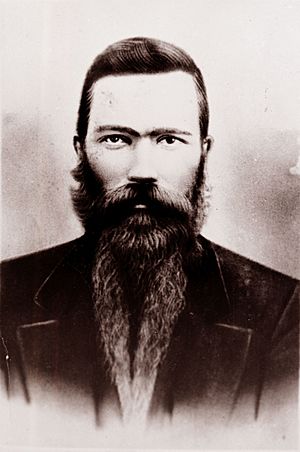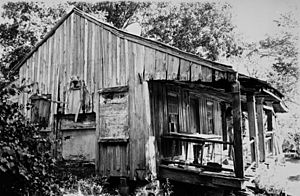Henry Berry Lowry facts for kids
Henry Berry Lowry (born around 1845 – disappeared after 1872) was an American figure known for leading a group in North Carolina. He was a Lumbee Native American. Many people in North Carolina remember him as a Robin Hood type of hero. He was seen as a natural leader who stood up for his community.
Contents
Early Life
Henry Lowry was born around 1845 in Robeson County, North Carolina. His parents were Allen and Mary (Cumbo) Lowry. His father owned a successful farm that was about 350 acres. Henry was one of 12 children in his family. They were described as multi-racial or free people of color.
The Lowry Gang
During the American Civil War, the Confederate government forced many local people to work. They had to build forts near the Cape Fear River for very little pay. Some of Lowry's family members, who were free men of color, were made to help build Fort Fisher.
The Lowry Gang first started to help people who were hiding from this forced labor. Many residents would "lie out" by hiding in the swamps to avoid being taken. As the Civil War ended, the Lowry Gang worked with Union soldiers who had escaped from Confederate prisons. They fought against the Confederacy in a style called guerrilla warfare, which means small groups fighting with surprise attacks.
The Lowry gang was known for robbing people, but they did it in a unique way. They treated the people they robbed with respect. Sometimes, if a victim could show they were poor, they might not be robbed. The gang often returned stolen items like horses and wagons once they no longer needed them. They were also known for sharing what they took with the poor, like giving corn to hungry families.
The Lowry War
Henry Lowry led his gang in a series of robberies and actions against the wealthy. This continued until 1872. The efforts to catch the gang members became known as the Lowry War. The gang included Henry Lowry, his brothers Stephen and Thomas, two cousins, two brothers-in-law, two escaped slaves, and a white man.
The Lowry gang kept up their actions even after the war during the Reconstruction period. In 1869, the Republican governor, William Woods Holden, declared Lowry and his men outlaws. He offered a large reward of $12,000 for their capture, dead or alive. Lowry responded by continuing his actions.
On December 7, 1865, Henry married Rhoda Strong. Right after their wedding, Lowry was arrested by former Confederate soldiers. He was accused of a murder. But he managed to escape by filing through the prison bars. His gang members had secretly given him a file. The governor at that time offered a $300 reward for him. But the gang avoided being caught for another three years. They even escaped from United States military troops sent to capture them.
In 1871, a colonel named Francis Marion Wishart led the hunt for Lowry. He held the wives of the Lowry gang members in prison. Henry Berry Lowry and his gang sent the colonel a strong letter. They demanded the release of their wives. They warned that if their wives were not freed, there would be "the bloodiest times" and everyone's life would be in danger. Soon after, their wives were released.
Lowry's gang was against the powerful conservative Democratic leaders after the war. These leaders wanted to regain control and keep white supremacy. The Lowry gang robbed and killed many people from this powerful group. Because of this, many non-white people in Robeson County supported them. The authorities could not stop the Lowry gang, mostly because of this strong local support. Later, a more moderate Republican party took power, which was more aligned with many of Lowry's supporters.
In February 1872, Henry Berry Lowry disappeared. This happened shortly after he robbed the local sheriff's safe of over $28,000. Colonel Wishart said that reports of Lowry's death were "ALL A HOAX." The $12,000 reward for his capture was never claimed. Some say he accidentally shot himself while cleaning his shotgun. But like many folk heroes, his death was debated. Some claimed he was seen at a funeral years later. Without Henry's leadership, almost all other gang members were caught or killed. Henry's brother, Reverend Patrick Lowry, said in 1872 that Henry was indeed dead. However, Henry's wife, Rhoda, believed until her death in 1909 that he had escaped. She even remarried a few years after he disappeared. Henry Berry Lowry had three children: Sally Ann, Henry Delany, and Nealy-ann.
Stories and Media
- Since 1976, a play about Lowry's story has been performed each summer. It is called Strike at the Wind! and takes place in Red Banks, North Carolina.
- The DVD Aftershock: Beyond the Civil War (2007) from the History Channel tells part of his story.
- Another History Channel DVD, Indian warriors: the untold story of the Civil War (2006), also features him.
- Through Native Eyes: The Henry Berry Lowrey Story (1999) is a documentary film about him.
Remembering Lowry
The home where the Lowry family lived was moved to the North Carolina Indian Cultural Center in Pembroke. In 2007, North Carolina put up a special highway marker. It is on Lowry Street in Pembroke and remembers Henry Berry Lowry.
Books About Lowry
- Evans, W. McKee. TO DIE GAME: the story of the Lowrie Band, Indian guerillas of Reconstruction. This book tells about the Lowry Band.
- Humphreys, Josephine. NOWHERE ELSE ON EARTH. This novel is about the time period.
- Norment, Mary C. THE LOWRIE HISTORY. This book was written in 1875 and tells about Henry Berry Lowrie.
- Thompson, R. Kaden. HENRY. This book loosely tells the story of Henry and the Lowry Gang.
 | George Robert Carruthers |
 | Patricia Bath |
 | Jan Ernst Matzeliger |
 | Alexander Miles |



